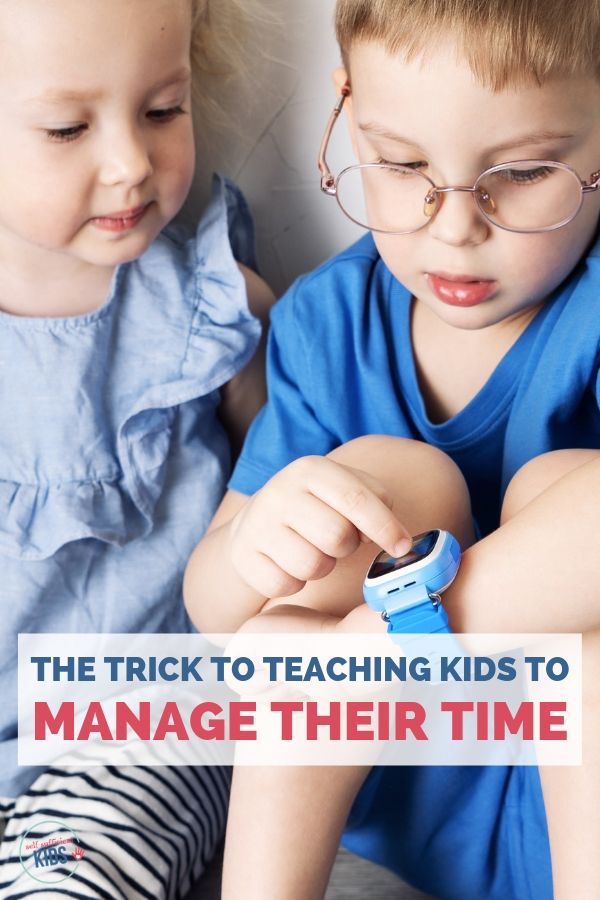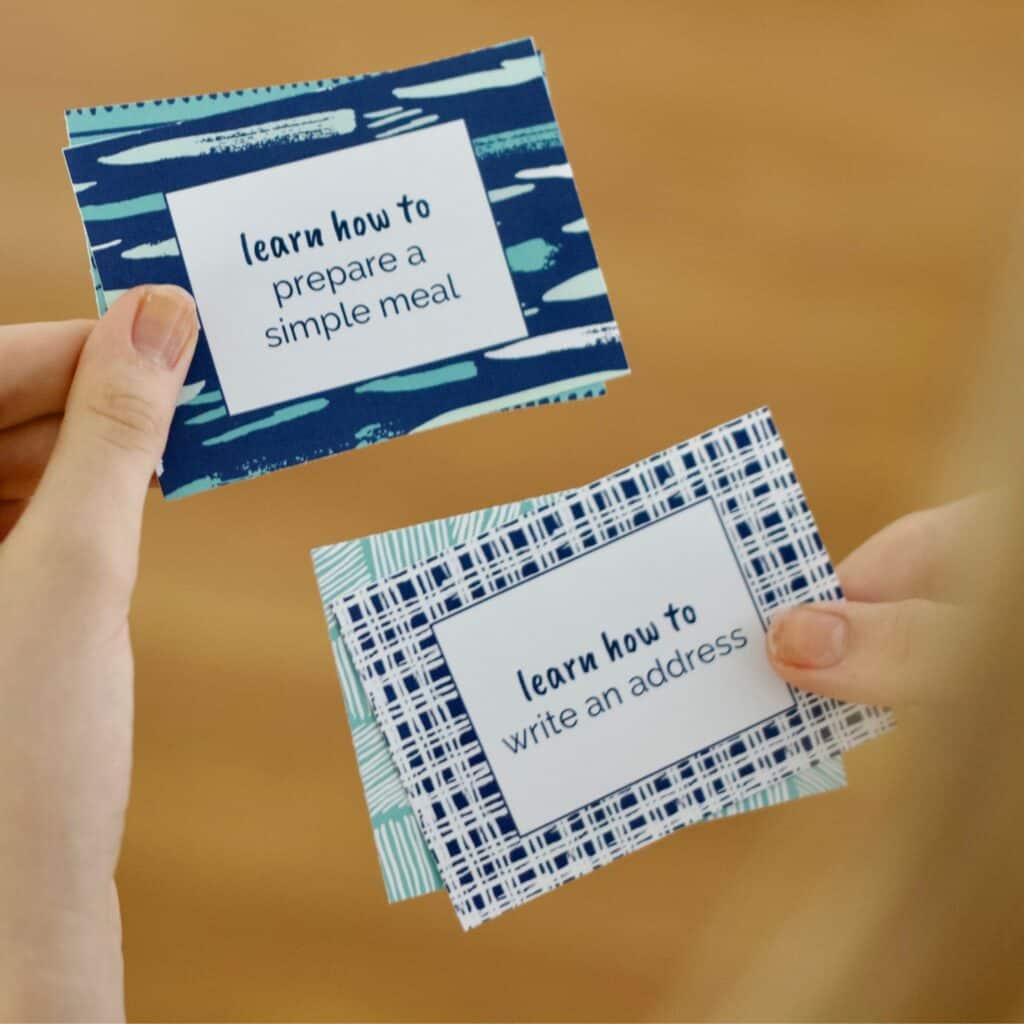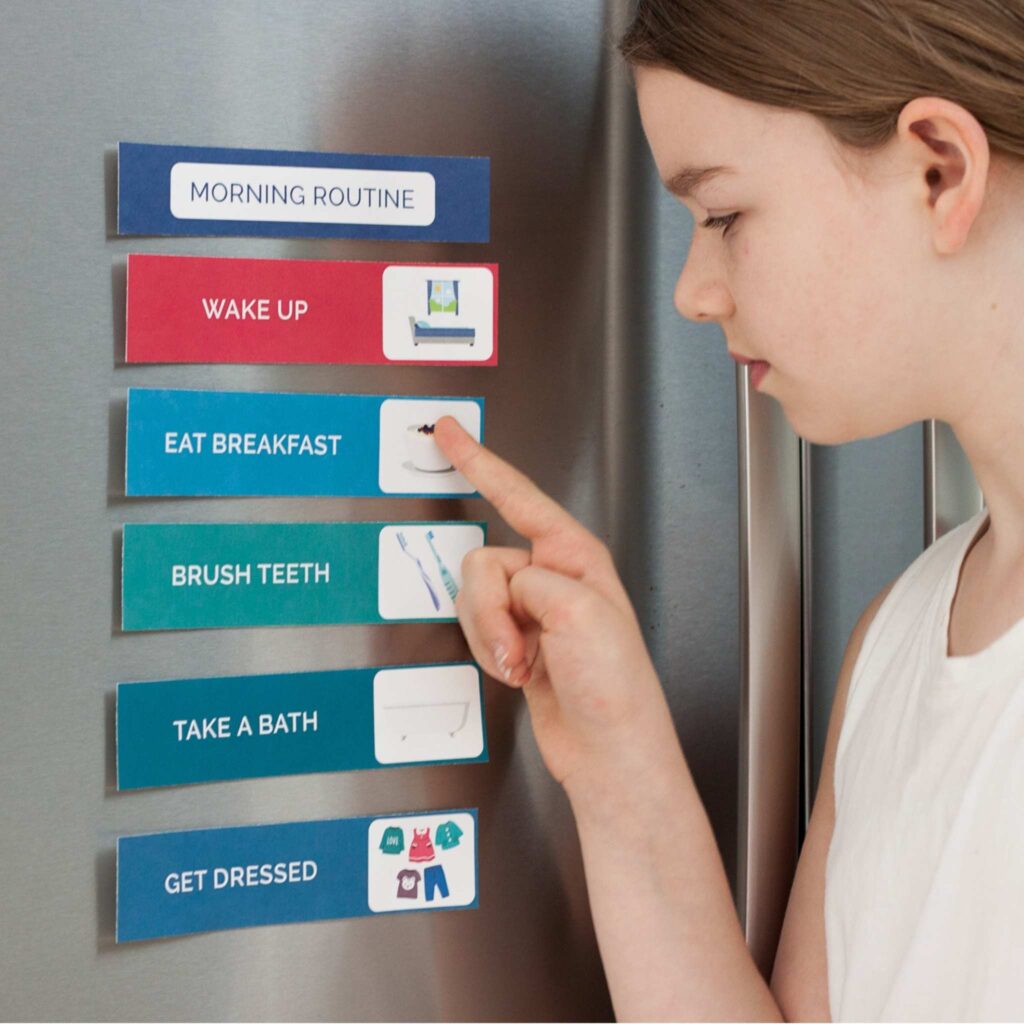The Trick to Teaching Kids to Manage Their Own Time and Get Things Done (Without Nagging)
Time management skills usually don’t come easily to kids. Here are a few ways to help kids manage their own time and get things done.

“How many times do I have to ask you to vacuum your room?”
“When are you going to begin your reading assignment?”
“Don’t forget you need to put away your toys before dinner tonight.”
Sound familiar?
Most parents have found themselves saying these or similar reminders to their children. Often multiple times. Often to the point of nagging.
It can be challenging for kids to manage their time and complete tasks we need them to do. After all, life is full of more desirable distractions – playing games, doing crafts, spending time with friends, or just simply daydreaming.
And while having the freedom to do these activities makes childhood special, eventually our kids will need to know how to manage their time. Getting assignments and tasks completed on time is a life skill every well-functioning adult needs to know.
Fortunately, with just a little extra effort we can teach our kids how to manage their time in a way that doesn’t involve nagging and truly empowers kids to take ownership of their time.
Ready to teach your child life skills? These cards can help! Each card in this eighty-one deck contains a skill your child can begin practicing with you or on their own. Click here or the image below to learn more.
Teaching kids time management without nagging
Although we don’t intend to, by nagging our kids to get something done, we’re diminishing any intrinsic motivation they may have to do it on their own.
Our constant reminders are not only annoying, they communicate to kids that they aren’t capable of accomplishing tasks on their own. Even if this seems to be true, we don’t want our kids to think of themselves this way. Taking ownership over time management will only happen when our kids view themselves as fully capable and not requiring help.
The trick then is to find ways to play an active role in helping our kids manage their own time, but make them feel they’re doing it themselves.
This requires a different approach when interacting with our kids about what they need to get done — more coaching and asking leading questions to help them develop their own plan. It may also include a few tough lessons for kids (for example, missing out on a fun activity due to poor time management ). But the goal here is to help our children become more self-sufficient so they can eventually manage their time without our intervention.
Here are a few ways we can help teach our kids time management:

For smaller tasks, have kids pick a time
Last Saturday, I noticed a basket of clean clothes in my ten-year-old’s bedroom. It had been sitting there for two days untouched.
In the past, I might have insisted she put away her clothes before doing anything else. But I knew ordering her to put away her laundry would only result in an argument and resentment. And worse, she’d be completing the task because I told her to, not because she knew it needed to get done.
So instead I asked: “At what time will you put your clothes away today?”
Putting clothes away is among my daughter’s least favorite tasks (me too, as it turns out) so the question wasn’t answered with enthusiasm.
To come up with a time, we discussed her schedule – what she had planned, how she wanted to spend her time, and ultimately when would be the optimal time to put away her clean clothes – which she decided would be four o’clock.
To give her even more ownership over the task, I set a timer so she would know when it was time to attend to her laundry.
At four-thirty I came upstairs to her room and peeked inside. An empty laundry basket sat in the middle of the room – all the clothes had been put away.
It’s not every time that my daughter completes a task right at the agreed-upon time, but there’s certainly been a lot less arguing since I’ve begun using this “pick a time” strategy.
Kids appreciate being able to choose their own destiny – to be in the driver’s seat, so to speak. By letting my daughter choose the time she’d complete the task, I wasn’t dictating how she needed to spend her time, the responsibility in her court.
Calm your crazy mornings (and afternoons, and evenings!) with these routine cards for kids. These cards allow kids to independently check what they need to do and in what order – so you don’t have to remind them! Click here or the image below to learn more.
For long-term projects, have kids write out a plan or schedule
This summer my middle schooler was given multiple homework assignments to complete before the start of school.
With almost three months to do all the reading and work she needed to do, I could she felt there was plenty of time to complete her assignments. But I knew better.
Not only would she be away from home for at least six weeks, between camps and family trips, but I also knew, at her age, it was still difficult for her to comprehend how much time she needed to complete these assignments and how much free time she actually had.
So after observing her making little progress for the first few weeks of summer, I grabbed a calendar, sat down with her, and had her write out a plan.
There are a few benefits to having kids write out a plan for long-term projects:
- It gives kids ownership over their work. Just like in the situation with my daughter putting her laundry away, by asking your child to create a plan you’re giving them ownership over their destiny. It also sends the message that you believe they’re capable of formulating and following through on their plan which boosts their self-esteem.
- It creates an informal contract your child has committed to. There’s no disputing what needs to get done when it’s been written down. And when a goal hasn’t been reached – for example, reading a certain number pages a day – it’s time to revisit the plan and reassess how the work can get done on time.
- It begins to teach kids study and life skills that will benefit them in the future. Time management is a skill that’s acquired and developed over a long period, not something you’re born with or that everyone immediately understands. The sooner kids begin to use plans and schedule their own time, the more prepared they’ll be for completing heavier homework loads, and later in life, work projects.
My daughter’s first plan was aggressive and I knew she couldn’t possibly finish all of her work in two weeks. I told her this but let her pursue it anyway – reminding her that she was the one responsible for getting the work done, not me.
When, inevitably, she began to fall behind in the plan, she revised it – not once but two times over the summer. These revisions were lessons onto themselves.
Also, at the end of the summer – when she’d thankfully completed all the assignments – she realized it would have been less stressful if she had dedicated a bit more time each day to her reading assignment, as opposed to trying to read a whole book in three days.
Don’t expect kids to be experts in time management right away. The point is to provide them with skills and practice that eventually let them manage their own time and learn from trial and error. The goal is to work towards acquiring this life skill that, like any other skill, requires time and patience from the person teaching it.
See related:
15 Life Skills Kids Need Before They Leave Home
The (Super Easy) Trick to Help Kids Get Ready for School Independently
How to Raise Responsible Kids Who Want to Help
What to do next…
1. Subscribe to Self-Sufficient Kids’ email list.
Like what you read here and want to learn more? Every Thursday I’ll send you one parenting tip about raising self-sufficient kids and creating the peaceful relationship you yearn to have with your child. Click here to sign up.
2. Take one of my quizzes!
Find out if you’re raising a self-sufficient kid (click here) or if you’re doing too much for your kids (click here). At the end of each quiz, you’ll be asked to provide your email address to see the results.
3. Get your kids started on chores.
Learn how to get your child started on chores (& keep them motivated + avoid power struggles) by enrolling in my Get Your Kids Successfully Started on Chores course. Click here to learn more and sign up.

About Kerry Flatley
Hi! I’m Kerry, the mother of two girls and a certified parent educator. I believe it is possible for parents to have a supportive, loving, and warm relationship with their kids while raising them to be independent and ultimately self-sufficient. Over the years, I’ve read numerous books and articles that support this belief and I’ve put these ideas into practice with my own kids. Read more about me and Self-Sufficient Kids here.



